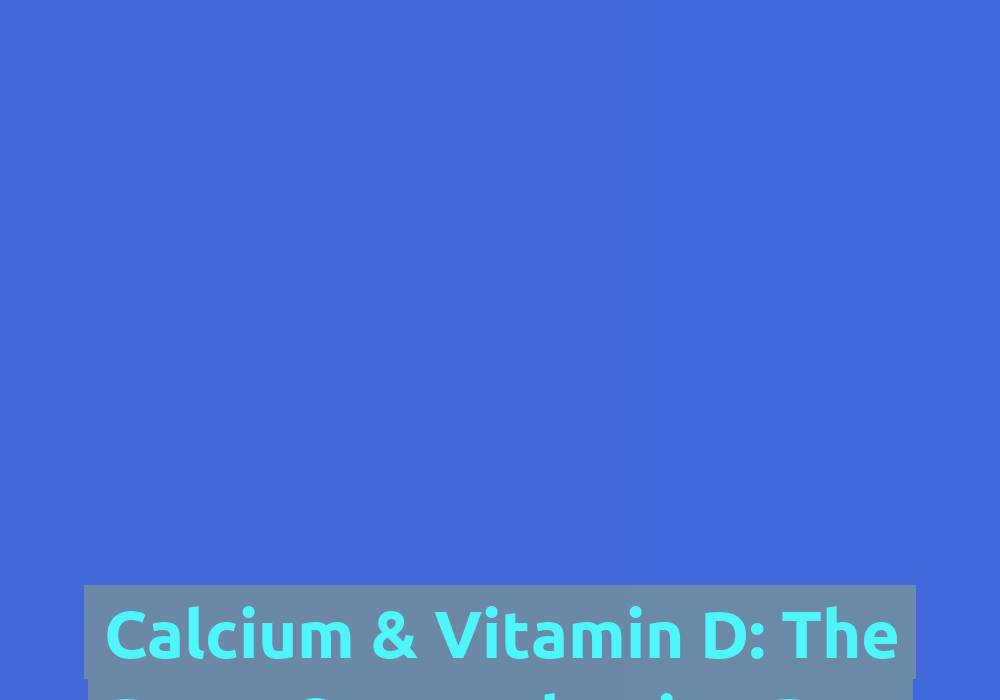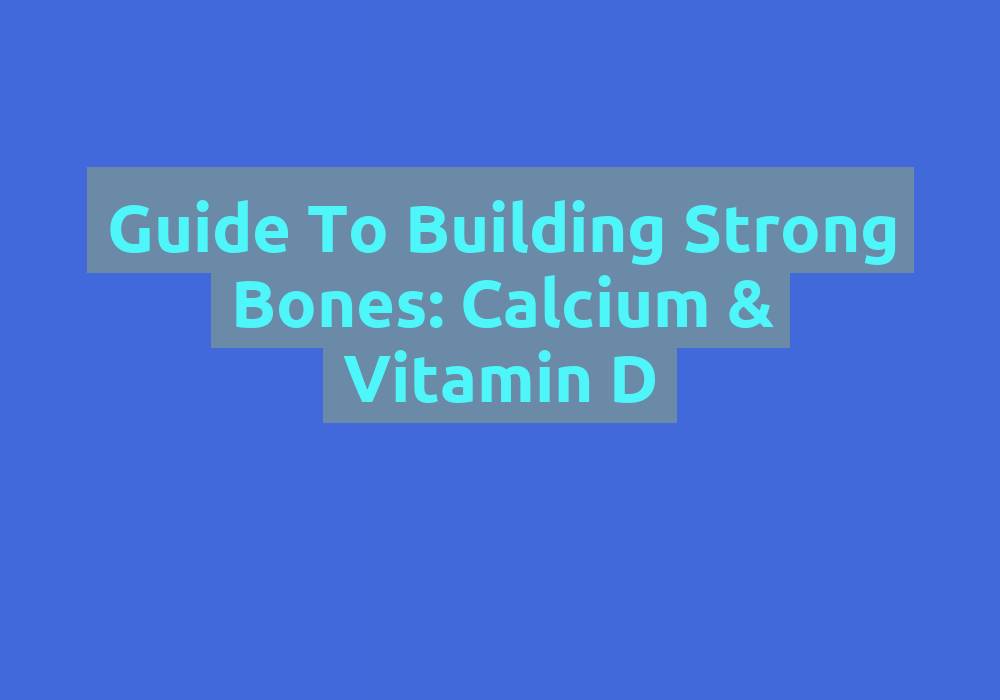Calcium & Vitamin D: The Bone-Strengthening Duo

When it comes to maintaining strong and healthy bones, there is no denying the importance of calcium and vitamin D. These two essential nutrients work together as a dynamic duo to support bone health and prevent conditions such as osteoporosis. In this article, we will explore in detail the benefits of calcium and vitamin D, how they contribute to bone strength, and the best sources to incorporate into your diet.
The Role of Calcium in Bone Health
Calcium is the most abundant mineral in our bodies, with approximately 99% stored in our bones and teeth. It plays a crucial role in maintaining bone structure and strength. Here’s why calcium is essential for bone health:
-
Bone Formation: Calcium is a key component of bone tissue. During bone formation, specialized cells called osteoblasts use calcium to build and repair bone structure. Without adequate calcium, bones may become weak and brittle.
-
Bone Maintenance: Throughout our lives, our bones undergo a process called remodeling. Calcium is necessary for this process, as it helps remove old bone tissue and replace it with new healthy bone. This continuous turnover of bone tissue is essential for maintaining bone strength and preventing bone loss.
-
Bone Strength and Density: Adequate calcium intake is vital for achieving optimal bone density, which refers to the amount of mineral content in our bones. Higher bone density is associated with stronger bones and a lower risk of fractures. Without enough calcium, bones may become porous and susceptible to fractures.
To ensure you are getting enough calcium, it is important to include calcium-rich foods in your diet. Here are some additional details about the benefits of specific calcium-rich foods:
-
Dairy products like milk, cheese, and yogurt: These are excellent sources of calcium, providing a significant amount per serving. Additionally, dairy products often contain other bone-building nutrients like protein and vitamin D.
-
Leafy green vegetables such as kale, spinach, and broccoli: These veggies are not only rich in calcium but also packed with other vitamins and minerals that contribute to overall bone health. They are a great option for those who follow a plant-based diet.
-
Tofu and soy products: These plant-based alternatives are also rich in calcium and are suitable for individuals who avoid dairy or follow a vegetarian or vegan diet.
-
Nuts and seeds, including almonds and chia seeds: These make for a convenient and nutritious snack that can contribute to your daily calcium intake. They are also a good source of healthy fats and other essential nutrients.
-
Fortified foods like orange juice, cereals, and bread: Some food products are fortified with calcium to help individuals meet their daily calcium needs. These can be beneficial for those who struggle to consume enough calcium-rich foods through their diet.
The Vital Role of Vitamin D
While calcium is essential for bone health, it cannot do its job effectively without the help of vitamin D. Vitamin D is unique because our bodies can produce it naturally when exposed to sunlight. Here are the key roles of vitamin D in relation to bone strength:
-
Calcium Absorption: Vitamin D enhances calcium absorption in the small intestine, ensuring that an adequate amount of calcium is absorbed into the bloodstream and made available for bone-building processes. Without sufficient vitamin D, calcium absorption may be limited, leading to calcium deficiency and weakened bones.
-
Regulating Calcium Levels: Vitamin D also plays a crucial role in maintaining proper calcium levels in the blood. It achieves this by regulating the amount of calcium absorbed by the intestines, reabsorbed by the kidneys, and released from the bones. This regulation is necessary to prevent calcium deficiency or excess, both of which can have detrimental effects on bone health.
-
Bone Mineralization: Vitamin D promotes the mineralization of bone tissue, which means it helps incorporate calcium and other minerals into the bone matrix, making them stronger and less prone to fractures. Without adequate vitamin D, bones may become weak and more susceptible to fractures.
To ensure you are getting enough vitamin D, it is important to include vitamin D-rich foods in your diet. Here are some additional details about the benefits of specific vitamin D-rich foods:
-
Fatty fish such as salmon, mackerel, and sardines: These types of fish are excellent sources of vitamin D. They not only provide a good amount of vitamin D but also offer omega-3 fatty acids, which have additional benefits for bone and overall health.
-
Cod liver oil: Cod liver oil is a concentrated source of vitamin D, making it a popular supplement. However, it is important to note that cod liver oil is also high in vitamin A, so it should be taken in moderation.
-
Egg yolks: Though the vitamin D content in eggs is relatively low compared to other sources, they still contribute to your overall intake. Including eggs in your diet can be a part of maintaining adequate vitamin D levels.
-
Fortified dairy products, including milk and yogurt: Many dairy products, especially those labeled as “fortified,” are enriched with vitamin D to help individuals meet their daily requirements. These products are a convenient way to increase your vitamin D intake.
-
Mushrooms exposed to sunlight: Just like humans, mushrooms can produce vitamin D when exposed to sunlight. Consuming mushrooms that have been exposed to ultraviolet light can be a natural way to obtain vitamin D.
The Benefits of Calcium and Vitamin D Together
When calcium and vitamin D are combined, their benefits for bone health become even more significant. Here are the key advantages of this bone-strengthening duo:
-
Optimal Calcium Absorption: Vitamin D enhances the absorption of calcium from the diet, ensuring that your body can efficiently utilize this essential mineral. This synergy between calcium and vitamin D promotes optimal bone health.
-
Reduced Risk of Osteoporosis: Osteoporosis is a condition characterized by weak and brittle bones. Adequate calcium and vitamin D intake throughout life can help reduce the risk of developing this condition. By working together, calcium and vitamin D support bone density and strength, reducing the likelihood of fractures and osteoporosis-related complications.
-
Improved Bone Density: Calcium, in combination with vitamin D, helps maximize bone density, which is crucial for maintaining strong and healthy bones. High bone density provides a solid foundation for overall skeletal health and can help prevent bone loss.
-
Lower Risk of Fractures: By improving bone density and strength, calcium and vitamin D supplementation can help lower the risk of fractures, especially in older adults who are more prone to falls. Adequate levels of calcium and vitamin D ensure that bones can withstand everyday activities and reduce the likelihood of fractures, promoting independence and quality of life.
To fully harness the benefits of calcium and vitamin D, it is important to ensure you are consuming adequate amounts of both nutrients through your diet or supplementation.
Best Sources of Calcium and Vitamin D
To ensure you are getting enough calcium and vitamin D in your diet, it is important to incorporate foods that are rich in these nutrients. Here are some excellent sources:
Calcium-Rich Foods:
-
Dairy products like milk, cheese, and yogurt: These are well-known sources of calcium and are often fortified with vitamin D, making them a great choice for bone health.
-
Leafy green vegetables such as kale, spinach, and broccoli: These vegetables are not only rich in calcium but also provide other essential nutrients like vitamin K, which plays a role in bone metabolism.
-
Tofu and soy products: These plant-based alternatives are not only rich in calcium but also offer other beneficial compounds like phytoestrogens, which may have positive effects on bone health.
-
Nuts and seeds, including almonds and chia seeds: These nutritious snacks provide a good amount of calcium, along with other important nutrients like magnesium and phosphorus, which contribute to bone health.
-
Fortified foods like orange juice, cereals, and bread: Many food products are fortified with calcium to help individuals meet their daily calcium needs. These fortified options can be beneficial for those who struggle to consume enough calcium-rich foods through their diet.
Vitamin D-Rich Foods:
-
Fatty fish such as salmon, mackerel, and sardines: These types of fish are not only rich in vitamin D but also provide omega-3 fatty acids, which have additional benefits for overall health.
-
Cod liver oil: Cod liver oil is a concentrated source of vitamin D, making it a popular supplement. However, it is important to note that cod liver oil is also high in vitamin A, so it should be taken in moderation.
-
Egg yolks: Though the vitamin D content in eggs is relatively low compared to other sources, they still contribute to your overall intake. Including eggs in your diet can be a part of maintaining adequate vitamin D levels.
-
Fortified dairy products, including milk and yogurt: Many dairy products, especially those labeled as “fortified,” are enriched with vitamin D to help individuals meet their daily requirements. These products are a convenient way to increase your vitamin D intake.
-
Mushrooms exposed to sunlight: Just like humans, mushrooms can produce vitamin D when exposed to sunlight. Consuming mushrooms that have been exposed to ultraviolet light can be a natural way to obtain vitamin D.
To ensure you are meeting your calcium and vitamin D needs, it may be necessary to consider supplementation. While a well-balanced diet should provide sufficient amounts of these nutrients for most people, some individuals may have specific circumstances that require additional supplementation.
Supplementation for Calcium and Vitamin D
While a well-balanced diet should provide you with sufficient amounts of calcium and vitamin D, some individuals may require supplementation. This includes people with limited sun exposure, strict dietary restrictions, or those with medical conditions that hinder nutrient absorption.
If you are considering supplementation, it is essential to consult with a healthcare professional who can assess your specific needs and recommend appropriate doses to ensure your overall bone health. They can help determine if supplementation is necessary and guide you in choosing the right products and dosages for your individual circumstances.
It is important to note that excessive intake of calcium and vitamin D can have negative health effects, so it is crucial to follow professional advice and not exceed recommended dosages.
Conclusion
Calcium and vitamin D are vital nutrients that work hand in hand to support bone health and prevent conditions like osteoporosis. By incorporating calcium-rich foods and ensuring adequate vitamin D exposure, you can strengthen your bones, improve bone density, and reduce the risk of fractures. Remember, a balanced diet, regular physical activity, and consultation with a healthcare professional are essential for maintaining healthy bones throughout your life.
Please note that the information provided in this article is solely for educational purposes and does not replace professional medical advice.
Q1: Why is calcium important for bone health?
A1: Calcium is essential for bone health because it plays a crucial role in bone formation, maintenance, and strength. It helps build and repair bone tissue, contributes to bone density, and prevents bones from becoming weak and brittle.
Q2: How can I ensure I am getting enough calcium in my diet?
A2: You can ensure you are getting enough calcium in your diet by incorporating calcium-rich foods such as dairy products, leafy green vegetables, tofu and soy products, nuts and seeds, and fortified foods like orange juice and cereals.
Q3: What is the role of vitamin D in bone health?
A3: Vitamin D is important for bone health as it enhances calcium absorption, regulates calcium levels in the blood, and promotes the mineralization of bone tissue. It ensures that calcium is effectively utilized by the body for bone-building processes.
Q4: How can I get enough vitamin D in my diet?
A4: You can get enough vitamin D in your diet by consuming vitamin D-rich foods such as fatty fish, cod liver oil, egg yolks, fortified dairy products, and mushrooms exposed to sunlight. It is also possible to produce vitamin D naturally when your skin is exposed to sunlight.


